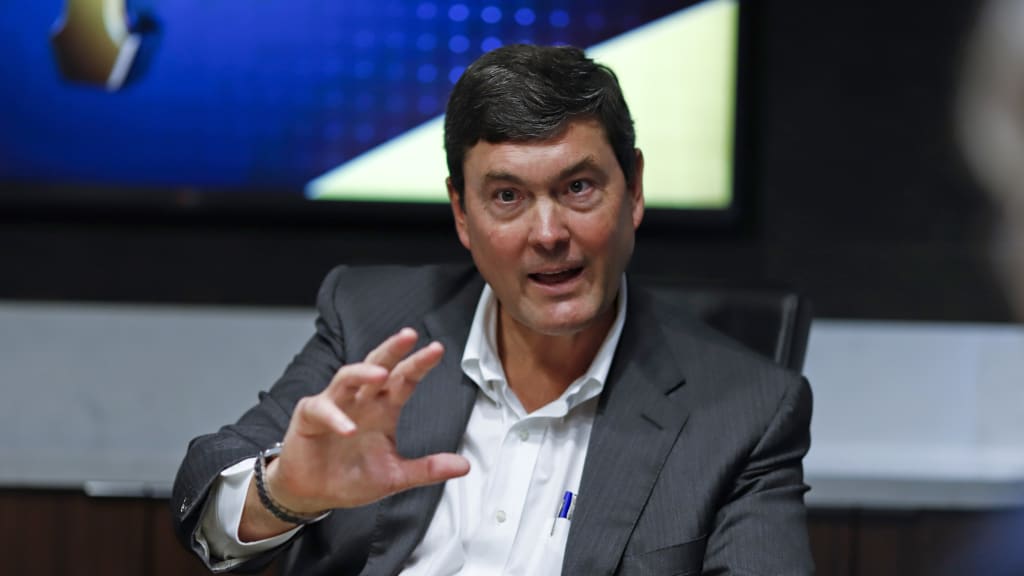
PITTSBURGH -- The Pirates ended their season on Sept. 29 with 69 wins, 93 losses, no manager and a lot of questions to answer in the offseason.
As they hugged and said their farewells in the PNC Park clubhouse, Pirates players generally struck an oddly optimistic tone considering everything that transpired over the previous two and a half months. The season wasn’t what anybody wanted, and their dismal second half led to the dismissal of manager Clint Hurdle and general manager Neal Huntington and the departure of president Frank Coonelly.
There were injuries, some that lasted for most or all of the season. There was in-fighting, with three documented fights in the clubhouse. There was the ugly situation surrounding the arrest of former closer Felipe Vázquez. There were too many lopsided losses, and 31 games in which the pitching staff allowed at least 10 runs. On the last day of the season, there was the removal of Hurdle from his post as manager. Less than a month later, there was Coonelly taking his leave after 12 years with the organization and Huntington walking out the door as the National League’s longest-tenured GM.
“I think we’ve experienced the low,” starting pitcher Trevor Williams said. “Next year or two years from now or three years from now, collectively as a team, I hope we’re having this conversation when we’ve won a pennant or we’ve won a World Series, and we can look back on this year and say, ‘If this didn’t happen, would we be in this spot?’ That’s only for time to tell, so we’ll see what happens.”
There were bright spots, sure, like the All-Star first-half performance by Josh Bell, the breakout rookie seasons of Bryan Reynolds and Kevin Newman, the consistency of Starling Marte, the emergence of backup catcher Jacob Stallings and the durability of starting pitcher Joe Musgrove. Before he was informed of his dismissal, Hurdle talked about Pittsburgh's pitchers benefitting from a more individualized pitching plan being implemented this offseason.
But now, there are questions. Here are five of many that the Pirates must answer this winter.
1. Who's leading the way?
Travis Williams will succeed Coonelly, and he’ll have a lot to learn in a hurry after spending the last decade working in the National Hockey League. He must replace Huntington, and the next general manager will have to re-staff the front office with an eye on improved player development. That GM must also decide whether to rebuild or stay the course with a flawed roster and limited resources.
How will the GM decision affect the Pirates' managerial search? Who will they pick to manage? And how will that manager fill out his coaching staff?
At the very least, they need a new bench coach and a replacement for pitching coach Ray Searage. They must also decide what to do with the remaining coaches who were invited to return, namely well-regarded hitting coaches Rick Eckstein and Jacob Cruz, though it’s worth noting that it was Huntington who retained those coaches.
Hurdle was hardly responsible for Pittsburgh’s roster construction or lack of pitching depth, but the manager is one of the most visible representatives of the club and a key figure in building the clubhouse culture. After this disappointing season, the Pirates need a new message, and the new manager will be the one sending it most often.
Will they stay in-house with special assistant Jeff Banister, believing he’ll benefit from his four-year managerial stint with the Rangers, similar to what Hurdle did from his time with the Rockies? Or will they look for someone younger, seeking to find their own version of the Dodgers’ Dave Roberts or the Rays’ Kevin Cash?
2. What changes will they make behind the scenes?
The answer here might be more beneficial for the long-term health of the franchise than any change in the manager’s office, assuming the Pirates’ new leadership group properly identifies their flaws and works to correct them. It could be a change in the personnel involved in drafting, developing and scouting, or it could be a change in process at various levels of the system. It likely will involve both.
Whatever they do, it’s clear that the Pirates need to be better at finding players and maximizing their talent. One of the more frustrating aspects of this season was the star-level performance of Austin Meadows and Tyler Glasnow in Tampa Bay, along with the Cy Young-level work of Gerrit Cole in Houston, the post-trade turnaround of Jordan Lyles and the continued renaissance of Charlie Morton.
From 2013-15, the Pirates were the team getting more out of players than they’d ever shown and they were built around a homegrown core. How can they get back to being that team?
3. How will they improve their pitching?
It may seem like a long time ago that the Pirates believed their 2019 team would be built around its pitching, but it was true -- and, for about a month, it seemed to be working. But due to injuries and ineffectiveness, the Bucs wound up with a 5.18 ERA that ranked 26th in the Majors. They weren’t great a year before, but their overall 4.00 ERA (14th in MLB) gave them a chance to be competitive in an 82-79 campaign.
Chairman Bob Nutting indicated the Pirates’ payroll won’t significantly increase, and it would be uncharacteristic for the Pirates to be involved in the pursuit of big-time free agents anyway. So most of their improvement will have to come from within -- and better defense wouldn’t hurt, either.
Will Searage’s replacement unlock more in pitchers like Williams, Musgrove, Steven Brault, No. 1 prospect Mitch Keller and, perhaps most importantly, Chris Archer? Will Archer even be back now that the men who acquired him are no longer working for the Pirates?
Arbitration-eligible Keone Kela seems likely to return as their closer after a dominant return from an early-season shoulder injury, but who will step up in front of him? Many of Pittsburgh’s blowout defeats this year were the result of a soft middle relief corps, but any solution on that front likely must be found internally, as well.
4. Who will provide the power?
The Pirates did some things well offensively this season. Their .265 average was tied for first in the NL, and only the Astros struck out fewer times among all Major League teams. But their .741 OPS ranked 10th in the NL -- and only the Marlins hit fewer home runs.
There is power potential in the lineup, mostly in the form of Bell and Marte. Reynolds and Newman set the table and provided occasional punch atop the order. But one key, almost forgotten, player heading into the offseason is rehabbing right fielder Gregory Polanco. Even before the power-hitting explosion of 2019, he led the Bucs with 23 homers and a .499 slugging percentage in '18. If Polanco could return to form and hit behind Bell, the Pirates have the makings of a more formidable everyday lineup.
5. How will they address the culture?
Some observers might assume this is all about the manager and coaching staff, but Musgrove pointed out after the Pirates’ season finale that Hurdle took a lot of blame over issues that players didn’t step up and address quickly enough.
A manager’s voice is bound to lose its impact over time, especially when he’s the only one speaking up, so expect the Pirates’ young leadership group to make accountability a focal point when they reconvene in February in Bradenton, Fla. Travis Williams has already said a lot of the right things about creating a sustainable winning culture, but there’s no doubt that wins and losses play a big part in the mood around a club.
